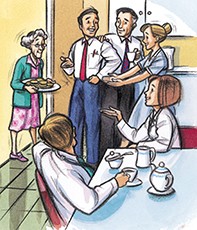Innocence revisited – 16
A patient from a more innocent time is the subject of this month’s tale from Dr Warwick Carter.
Practice Pet
‘Pikelets anyone?’
Every Thursday for almost 10 years, all the doctors and receptionists at the surgery enjoyed pikelets for morning tea. The pikelets were brought to us by an elderly widow whose family had long since moved away.
Grown up grandchildren visited occasionally, but the widow’s weekly visit to the surgery was the highlight of her week. She would sit in the waiting room chatting to the staff and any patient who was in the mood for conversation. When it was busy she would enjoy watching the bustling scene, or read the latest (two-month-old) Women’s Weekly from the pile of magazines.
Often she would join us in the staffroom for morning tea, as we buttered and jammed her delicious fresh pikelets. As the medical rep of the day intoned the delights of the latest antihypertensive agent to barely interested doctors, our visitor would have a look of intent concentration on her face, as though she was fascinated by every syllable of the medical jargon.
The staff, patients and reps loved her. As I called the next patients in for a consultation after her visit they would all comment on the sweet little old woman who had remembered about their previous visits several months ago.
Every four weeks, as regular as clockwork, she would book an appointment with me (the last before our morning tea) to discuss her health. Other than her minimal dose of digoxin, she took no medication, and was extraordinarily well.
Changing times
Time and progress caught up with the practice. We moved away from the dilapidated strip of a shopping centre in the back streets to a modern, purpose built medical centre. It was only 200 metres away, but it was uphill and doubled the distance that our ‘practice pet’ had to walk to bring us her pikelets.
She found the journey in the hot Queensland sun more difficult as time went on, and so the roles were reversed. Once a month I would visit her for morning tea and pikelets, and after our refreshment and brief consultation, I would return to the surgery with a Wedgwood china plate heaped high with pikelets for the rest of the staff.
She had become such an institution at the surgery that the receptionists would drop in to her home for a chat, take her shopping, and bring her up to the surgery when a favourite drug rep was due to visit. She always came to our staff Christmas party.
One Sunday afternoon when I was not on call, my daughter interrupted my gardening to say a patient was on the phone. For some unknown reason, instead of just giving the message of who was on call for that weekend, I went in to the phone.
‘Doctor, I don’t feel very well.’
I recognised the voice instantly. The widow had never called me at home before, and 10 minutes later, still in my dirty gardening shorts, I was beside her as she lay on the couch in her sitting room.
She was cold, blue and dyspnoeic with a rapid, fluttering, weak pulse. Her heart failure had suddenly become acute. I said I would call an ambulance and get her to hospital as soon as possible, but she gripped my hand as hard as she could and said with all the determination and grit she could muster that she wanted to stay just where she was, so that she could die while looking at the windows. Her long dead husband had been a master craftsman and had created magnificent stained glass windows, some of which were over their front door, framing their sitting room window, and set into other windows of the house.
A peaceful end
My friend smiled quietly at me, gazed at the windows for about five minutes, and then closed her eyes. Her grip on my hand remained as firm as ever, then a time later (it could have been anything from five minutes to an hour) the grip gently eased, and at the grand age of 93 years she quietly passed away. MT

